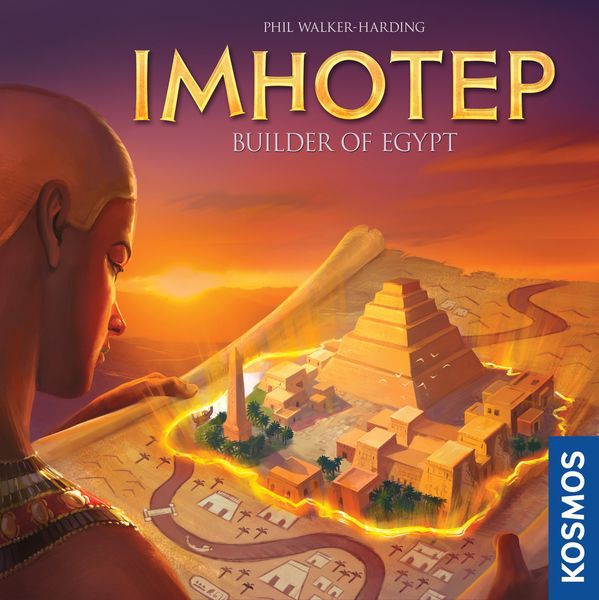Imhotep (2016) Board Game
Brief History and Background Information for Imhotep
Imhotep is a board game released in 2016, designed by Phil Walker-Harding. The game is set in ancient Egypt, where players take on the role of master builders competing to construct monuments in honor of the pharaoh.
Game Components of Imhotep
- Game board
- 120 wooden cubes
- 5 double-sided market cards
- 1 supply sled
- 8 ship tokens
- 4 player boards
- 21 round cards
- 34 market cards
How To Setup Imhotep
- Place the game board in the center of the table.
- Each player takes a player board and places it in front of them.
- Shuffle the round cards and place them face down.
- Shuffle the market cards and place them face down.
- Each player takes a supply sled and places it in front of them.
Gameplay Mechanics and Game Objective
In Imhotep, players take turns placing their wooden cubes on ships to deliver them to different locations in Egypt. Players can either build monuments, collect resources, or transport materials to different sites. The game ends after six rounds, and the player with the most points wins.
Player Experience
Pros
- Easy to learn and teach
- Strategic depth with multiple ways to score points
- Beautiful artwork and components
- Quick gameplay with a good pace
Cons
- Limited player interaction
- Some rounds may feel repetitive
- Luck can play a role in the game
Personal Thoughts on Imhotep
Overall, I enjoyed playing Imhotep. The game has a good balance of strategy and luck, making each playthrough unique. The components are well-made and visually appealing, adding to the overall experience. However, I do wish there was more player interaction to make the game more engaging.
In terms of pricing and availability, Imhotep is reasonably priced and can be found in most board game stores. If you enjoy games with a mix of worker placement and set collection mechanics, then Imhotep is worth your time. It is suitable for players aged 10 and above, making it a great family game. However, if you prefer games with higher player interaction, you may want to skip this one.
Overall, Imhotep is a solid board game that offers a good mix of strategy and fun.
Game Components of Imhotep
How To Setup Imhotep
To set up Imhotep, players start by shuffling and placing the Round Cards face-down near the main scoreboard. Each player receives a supply sled and a set of stones. The site boards are placed within reach of all players, and the Market area is prepared with face-up Market Cards. Players take turns performing actions such as taking stones from the quarry, placing stones on ships, sailing ships to construction sites, and using special Blue Tool Cards.
Gameplay Mechanics and Game Objective
Player Experience
Imhotep offers a dynamic and engaging experience with a strong tactile element. Players enjoy loading up blocks, sailing ships, and creating markets, all of which contribute to a robust table presence. The game’s simplicity in rules contrasts with its depth in strategy, making it appealing for both new and experienced players. However, the game can get intense, especially at higher player counts, as players fight for limited spaces and resources.
Pros
Cons
Personal Thoughts on Imhotep
Imhotep is perfect for those who enjoy strategic games with a strong thematic presence. It’s an excellent gateway game that introduces players to more complex mechanics without overwhelming them. If you’re looking for a game that combines competition, strategy, and a unique tactile experience, Imhotep is definitely worth considering. However, if you prefer games with less direct competition or fewer random elements, you might want to look elsewhere. Overall, Imhotep is a great addition to any board game collection, especially for those who appreciate the blend of simplicity and strategic depth.
We are supported by our audience. When you purchase through links on our site, we may earn an affiliate commission, at no extra cost for you. Learn more.

